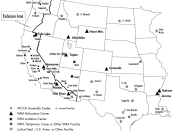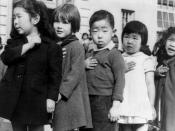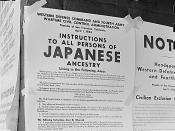In the year 1941, Japan bombed Pearl Harbor. It was during this time that the United States had about 112,000 people of Japanese ancestry residing in the U.S., two thirds of them being U.S. citizens. Because of the attack on Pearl Harbor, American's began to ponder at the thought that these people of Japanese ancestry might not be loyal to the United States, but to Japan. Feeling that they were a threat, in 1942 President Roosevelt issued Executive order 9066, to send the Japanese to concentration camps. This brings up the ongoing debate, and historical question, did the war with Japan justify any of the fears that led to the internment of 112,000 people of Japanese ancestry on the west coast in 1942?Many people believe the war with Japan did not justify the internment of the 112,000 people of Japanese ancestry. One reason for this is because of the harsh treatment towards the Japanese.
For example, before internment, Japanese were harassed, refused welfare services, and fired from their jobs. These unjust acts affected their status in the economy, and in a way exiled them socially. There also was racism against the Japanese. There were signs that said things like "slap the Jap in the yap!" and "Tokio Kid say rubber scrap not good for Jap" (VD1Debating).
Another reason the internment of the Japanese was not justified was because of how they were isolated. The 112,000 people of Japanese ancestry were isolated in regions geographically, such as mountains and deserts. Not only were they isolated, but the camps they were forced to stay in weren't exactly a luxury. Guards and barbed wire surrounded the barren, cramped camps. This extreme isolation had a great psychological effect on the Japanese (VD3Debating). Going to live in relocation camps meant that they could not keep...



Japanese internment
In the first paragraph, the writer begins with several awkward phrases such as "In the year 1941" and "American's began to ponder at the thought." The writing smooths out as the essay continues, but it remains jumbled, jagged, and not focused. Also, the writer overlooks two remarkable sources: the Supreme Court cases litigating the constitutionality of this program, and the eventual payment of reparations to the Japanese who were interred.
1 out of 1 people found this comment useful.